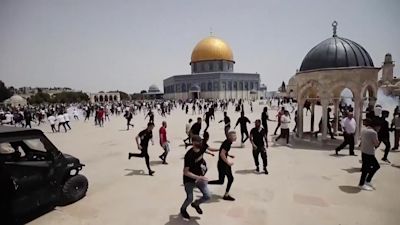Gaza truce holds but clashes break out between Israeli police and Palestinian protesters at Al-Aqsa Mosque

Global Security Editor Rohit Kachroo on the violence breaking out between Israeli police and Palestinians at Al-Aqsa Mosque
A ceasefire between Israel and Hamas faced an early test when clashes broke out between Palestinian protesters and Israeli police following Friday prayers at the Al-Aqsa Mosque compound.
It was unclear what sparked Friday’s violence at the mosque, a flashpoint holy site in Jerusalem which triggered the 11-day war between Israel and Hamas earlier this month.
Police fired stun grenades and tear gas, and Palestinians hurled rocks after hundreds took part in a celebratory demonstration in which they waved Palestinian and Hamas flags and cheered the militant group.
Israeli police said they arrested 16 people.
ITV News Senior International Correspondent John Irvine reports from Gaza, as Palestinians returned to the city:
The clashes come on the first full day of the ceasefire in the area.
Palestinians who had fled Gaza City under a barrage of Israeli airstrikes returned once more, some found their homes destroyed.
Shahada Faiza returned to her apartment in the city on Friday to find the front of it ripped off.
Her home was one of three flats damaged when a bomb went through several floors of the building.
She told ITV News' John Irvine she's a widow, who lives alone, and sees no justification for what has happened in Gaza over the past 11 days.
She said as a proud Palestine, she'd get through it.
ITV News saw remnants of the airstrikes upon Gaza from the past 11 days.
Some bombs, that failed to detonate, were being removed from the streets as our cameras filmed.
Palestinians we spoke to said they were "sad" and "tired."
Elsewhere in the region on Friday protesters clashed with Israeli troops in parts of the occupied West Bank - which has seen violent demonstrations in recent days linked to Jerusalem and Gaza.
'I feel so sad, people were dying here'
Thousands took to the streets of Gaza as the cease-fire took hold at 2am.
Young men waved Palestinian and Hamas flags, passed out sweets, honked horns and set off fireworks.
Celebrations also broke out overnight in east Jerusalem and across the occupied West Bank.
Rohit Kachroo on what is changing now in the wake of the ceasefire
Israel captured all three territories in the 1967 war and the Palestinians want them for their future state.
The 11-day war left more than 250 dead - the vast majority Palestinians - and brought widespread devastation to the already impoverished Hamas-ruled Gaza Strip.
It is the worst Israeli-Palestinian violence since 2014.
The Gaza Health Ministry says at least 243 Palestinians were killed, including 66 children, with 1,910 people wounded.
It does not differentiate between fighters and civilians. Twelve people were killed in Israel, all but one of them civilians, including a 5-year-old boy and 16-year-old girl.
Palestinians returned to survey the damage of their homes caused by hundreds of Israeli airstrikes that it says have targeted Hamas’ infrastructure, including a vast tunnel network.
Hamas rocket missiles, that brought life to a standstill in much of Israel were seen by many Palestinians as a bold response to perceived Israeli abuses in Jerusalem, the emotional heart of the conflict.
Earlier on Friday, Israeli Prime Minister Benjamin Netanyahu warned against further attacks, saying: "If Hamas thinks we will tolerate a drizzle of rockets, it is wrong."
He vowed to respond with “a new level of force” against aggression anywhere in Israel.
He added that Israeli forces had caused “maximum damage to Hamas with a minimum of casualties in Israel.”
He said Israeli strikes killed more than 200 militants, including 25 senior commanders, and hit more than 60 miles of militant tunnels.
On Friday, a funeral took place for members of the Izzedine al-Qassam Brigades, the military wing of Hamas movement, who died in the Israeli bombardment of a tunnel.
Hamas and the Islamic Jihad militant group have only acknowledged 20 fighters killed.